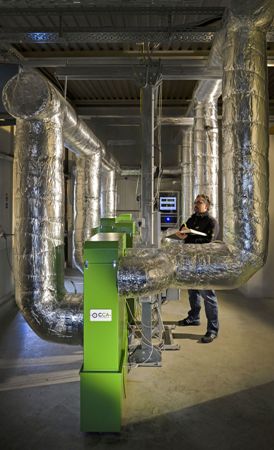Nov 24 2015
Renewable fuels, such as wood chips, pellets, and firewood are popular. For wood-fired heating systems and furnaces to comply with the new stricter fine dust limits in Germany, particle separators are used to clean the flue gas. The particle separator made by CCA, a spinoff of KIT, has now been granted the national technical approval by the Deutsches Institut für Bautechnik (DIBt). A long-term test revealed that it works effectively and in an economically efficient manner.
 The CCA separator (light green) efficiently removes fine dust from flue gas of wood-fired boiler systems. (Photo: KIT)
The CCA separator (light green) efficiently removes fine dust from flue gas of wood-fired boiler systems. (Photo: KIT)
According to data of the FNR, the central project-coordinating agency in the area of renewable resources, about 850,000 wood-fired boiler systems are operated in Germany. Wood combustion is a major source of emissions. Often, their emission rates by far exceed particulate emission by vehicle traffic. Now, the second stage of the first Federal Emission Control Ordinance (1st BImSchV) has reduced the permissible limits for particulate emissions to 20 milligram per cubic meter. Lower emissions are to be reached by both new furnaces and the installation of filter systems.
The separator made by Carola Clean Air (CCA) is installed in the flue gas passage between the boiler and the stack and reduces concentration of carbon black and fine dust by up to 90 percent. The Deutsches Institut für Bautechnik (DIBt) has now granted the national technical approval to the fine dust separator types CCA25 to CCA200. The Carola separator is the first dry separator approved in Germany for installation in large boiler systems of up to 200 kW.
The functional principle of the CCA separator is rather simple: The separator consists of two chambers. In the ionization chamber, the flue gas particles are electrically charged by corona discharge. In the downstream collector chamber, the charged carbon black and dust particles deposit on a spiral brush. It regularly rotates across a scraper and the collected particles drop into the collection tank. “Every few months, we have to empty the tank. This is the only maintenance work required,” Dr. Hanns-R. Paur, scientist of KIT and one of the founders of CCA, explains. Thanks to its smart design, the separator can be installed both into an existing boiler as well as into newly developed systems. If necessary, several systems can be connected in parallel or series. The field test under typical operating conditions has demonstrated that the separator can be operated reliably over a long term of 5000 hours and that the high separation rate, small electric power consumption, and low pressure loss can be maintained stably.
“Advantages of our separator over other principles are obvious,” Dr. Hans P. Rheinheimer, Managing Director of CCA GmbH, says. “The system is nearly maintenance-free, can be integrated into the boiler, and it needs less energy than a bulb during operation. In contrast to HEPA filters, it is not necessary to exchange wear parts. Exhaust air outflow in the stack is not reduced. With a separation efficiency of up to 90%, modern backfitted boilers can comply with the limits of the second stage of the Federal Emission Control Ordinance of 2015.”
The spinoff Carola Clean Air GmbH uses KIT’s know-how relating to separation systems for wood-fired boilers. Industry partners are the boiler manufacturers HDG Bavaria and Heizomat.
For their innovative process, the inventors have already won several awards, such as the Innovation Award of the Karlsruhe Chamber of Industry and Commerce and the Environmental Award of Sparkasse Pforzheim Calw. Development of the CCA particle separator was financed by the Federal Ministry for Economic Affairs and Energy, the Federal Ministry of Food and Agriculture, and the HGF Enterprise Fund.
Source: http://www.pkm.kit.edu/